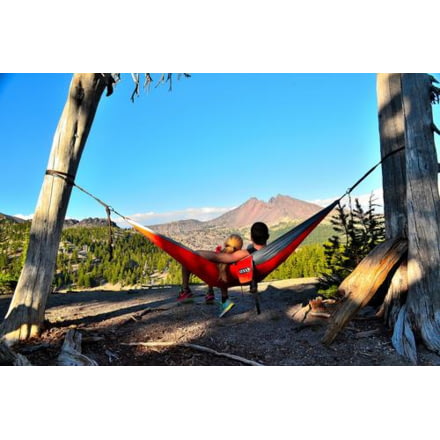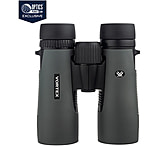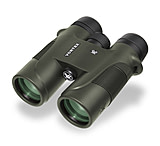Getting a good night’s sleep on the trail is crucial to have the proper energy to take on your day. At some point during your backpacking trip, you’ll need to set up shop for the evening to unwind and catch those Z’s. Will you seek shelter in an enclosed tent? Or will you swing freely in the night breeze on a hammock?![]()
While tent camping and hammock camping can offer similar experiences of nature, there are important differences between the two that every outdoor explorer should know about. In this guide, we’ll break down the pros and cons of camping in a tent vs. camping in a hammock to help you choose the best camping method for your next outing.
Why You Should Consider Hammock Camping
Most people associate tents with camping, but camping in a hammock has some key advantages on the trail.
Hammocks Are More Affordable Than Tents
Perhaps one of the biggest benefits of hammock camping is the price. Some higher-end hammock models are even cheaper than your average tent, meaning you can spend less money on a higher-quality sleeping solution.
Hammocks Can Be More Comfortable Than Tents
Sure, you can shell out for all the bells and whistles on a premium tent with cots, top-notch sleeping bags, and other tent accessories, but when it comes down to it, sleeping in a hammock can be much more comfortable than a tent. You’re suspended in the air above any jagged rocks or uneven ground. Plus, the cool night breeze is quite refreshing, whereas tents can sometimes feel a bit stuffy.
If you stake a tent at the beach, you’ll receive several strange glances, and it might even be against the law to do so in certain areas. However, you can hook up a hammock nearly anywhere for on-the-go comfort.
Hammocks Are Easier to Pack and Carry
Depending on your fabric and hammock accessories, it is usually much easier to stow a hammock in your backpack than a tent. Tents have a lot of fabric and poles to boot, making them more difficult to travel in some scenarios, but hammocks weigh less and are easier to carry throughout the day.
Disadvantages of Hammock Camping
While hammock camping is a fantastic choice for backpackers, it’s important to understand the disadvantages to ensure you make the right decision on your next excursion and have the essential camping gear and hammock accessories, if needed.
Your Setup Options Are More Limited
The proper hammock setup requires tree straps (or hammock hanging straps) and appropriately spaced trees. It is usually not too difficult to find a spot to hang your hammock in the right setting, but there are fewer options compared to a camping tent.
Hammocks Offer Less Protection and Warmth
Hammocks alone do not provide the level of weather protection and warmth that tents do, which is essential during the year's colder months. However, you can purchase an additional rainfly, mosquito net/bug net, underquilt, or waterproof hammock tarp to increase your protection against mosquitos, rain, and other elements of nature. Plus, hammocks are not ideal in bear country since you’re exposed to the wilderness.
Hammocks Are Usually Built for One Person
Two-person hammocks exist, but they still don’t offer much wiggle room. When hammock camping with others, you all may need to bring your own hammocks if you want additional space, privacy, and comfort.
Why You Should Consider Tent Camping
On the other side of the debate is tent camping. Here are some of the primary advantages of camping in a tent versus camping in a hammock.
Tents Can Be Easier to Set Up
At first glance, it may seem like tents are more complex to set up than hammocks, but seasoned pros know there are a lot of nuances to setting up a hammock. You need to find sturdy trees and at a suitable distance, and you need to adjust the straps each time to accommodate for the differences in distance.
Tents Offer More Privacy
Hammocks leave you exposed to nature and those around you, but tents offer enough coverage to give you a bit of privacy in the outdoors. If you’re shy about changing clothes or cleaning up in front of others, a camping tent is the best option for you.
Tents Provide More Coverage and Warmth
Tents are enclosed shelters that protect you from the elements and roaming wildlife. With the proper sleeping bag or sleeping pad, you can stay warm and cozy even during the colder seasons of the year. Since tents are completely sealed, you can gain better peace of mind knowing it will be harder for any critters to find their way in. While suspended hammocks can also prevent this, it’s more of a mind-over-matter scenario for certain campers.
Tents Have More Storage Space for Gear
Most tents, especially those made for two or more people, provide extra room to store your gear and camping accessories. Also, you have extra room to enhance your comfort with sleeping bags, sleeping pads, or cots.
Disadvantages of Tent Camping
Tent camping is much more popular than hammock camping these days, but there are some important aspects to know before you make your decision.
Tents Cost Much More Than Hammocks
As mentioned earlier, even tents on the lower end of the price scale can cost more than a high-quality hammock, especially 2-person and 3-person tents. However, think of your tent as an investment. A top-of-the-line tent will last several years and can provide you with countless adventures and beautiful memories.
It May Be Difficult to Find a Good Area to Set Up
Hammocks and tents both have their nuances when it comes to setup. In this case, you need to find a flat plot of land that offers enough space for your large tent. This area should be free of rocks and other obstacles that could cause discomfort. Thankfully, a durable tent footprint can even out those rough textures to create a more suitable sleeping surface.
Tents Can Take Up More Space in Your Pack
High-quality tents are usually designed to be packable and lightweight, but if that is out of your budget, other tents tend to be bulky and will take up a lot of room in your bag. If this is a concern for you, look for a lightweight tent to avoid extra heavy loads during your camping trip.
Have a Foot in Both Camps
Tent camping and hammock camping are both excellent choices for any backpacking adventure, and it’s not fair to claim one is better than another; it all just comes down to your personal preferences and seasonality. We hope you have a fun and safe camping trip, and for tips on purchasing your next tent, check out our guide on The Best 2-Person Camping Tents for Summer.






